Exciting biography of the courageous and socially committed founder of the Albert Schweitzer House, who defied the Nazis and bought the house with the compensation money after the war, based on her documents and notes.
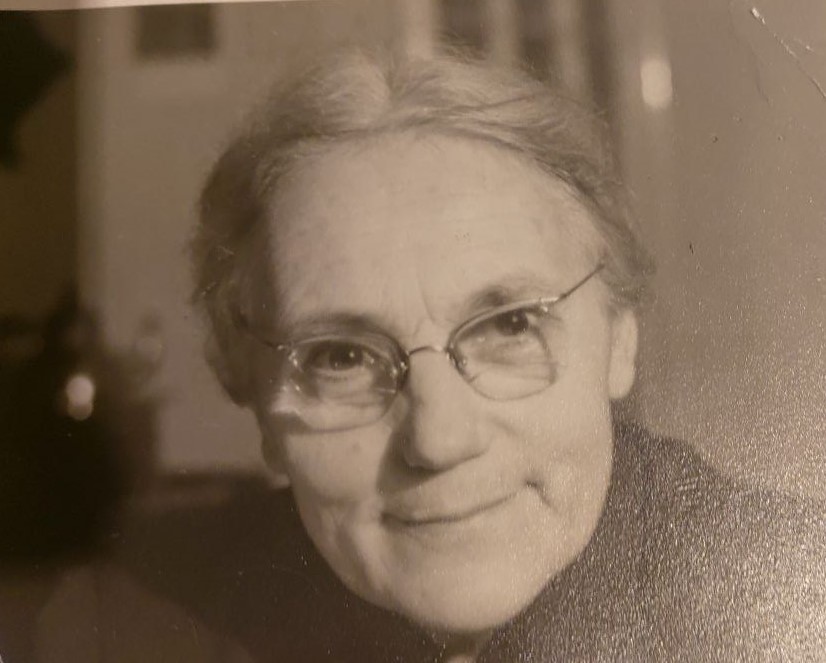
.jpeg)
Her name was Emma Schubmehl, born on January 26, 1895 in Ottweiler.
.jpeg)
From 1914 to 1927 she worked as a nurse in field hospitals at various locations for the war wounded and disabled from the First World War,
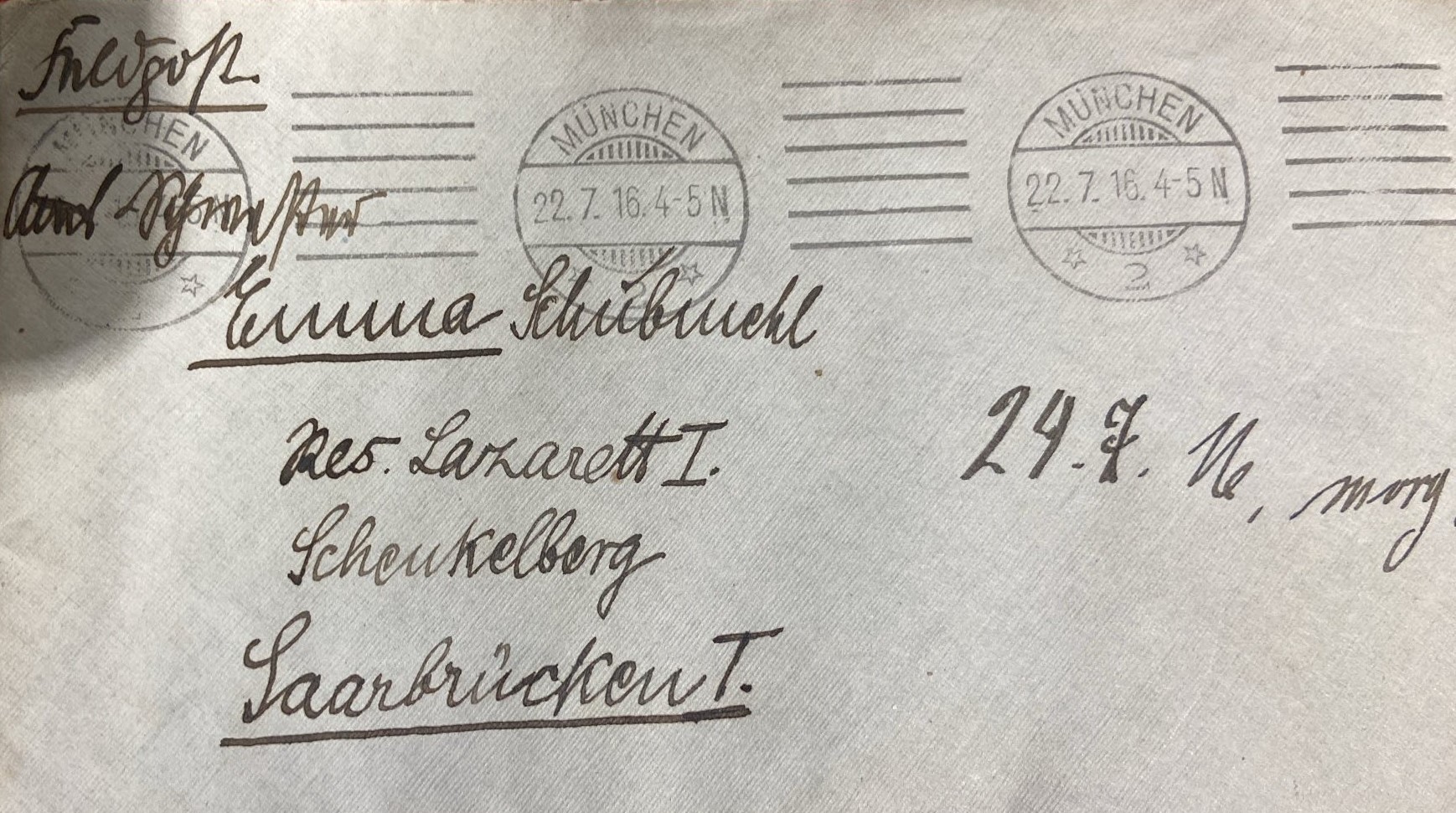
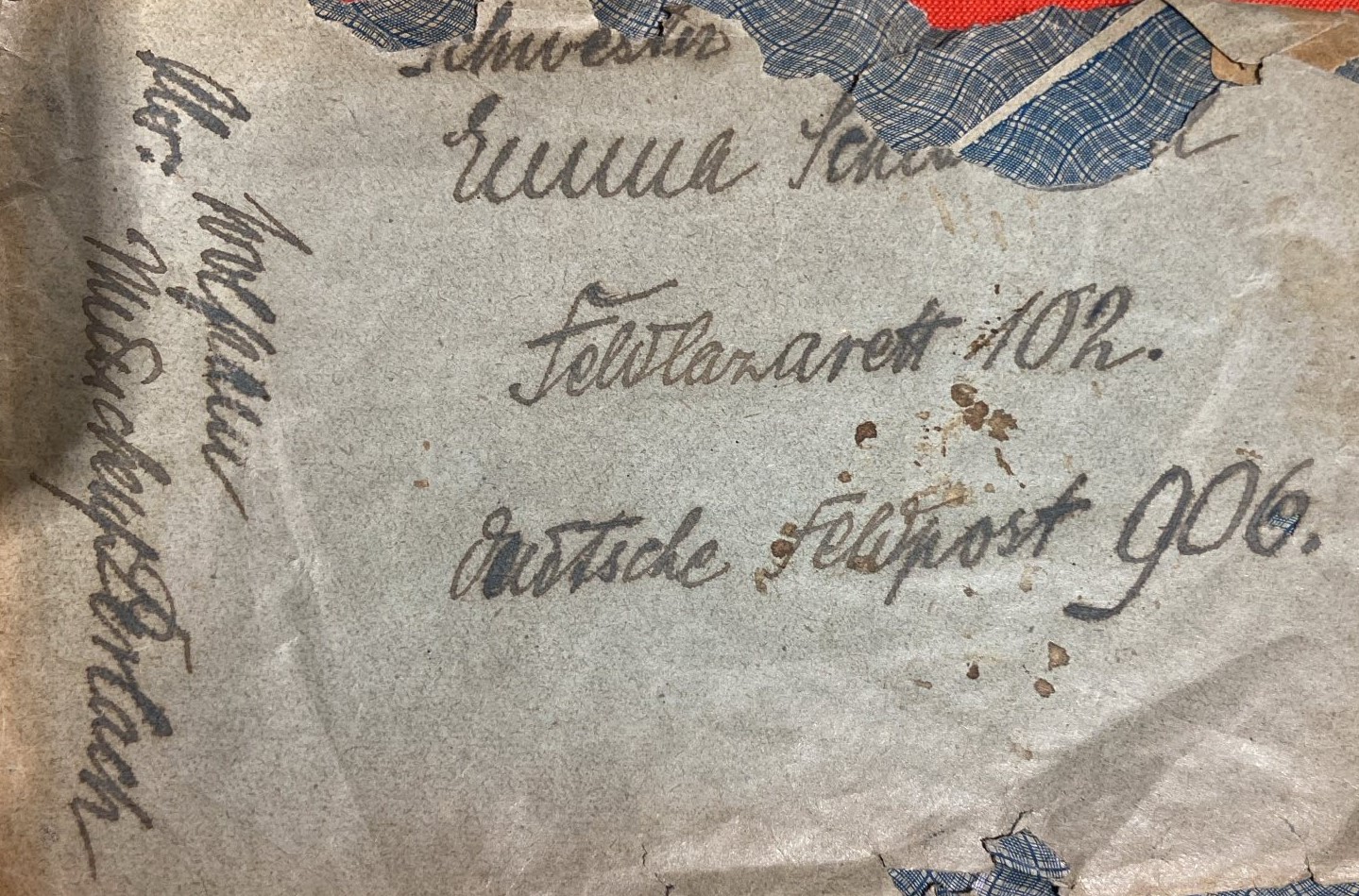
and in the care of war-disabled and those at risk.
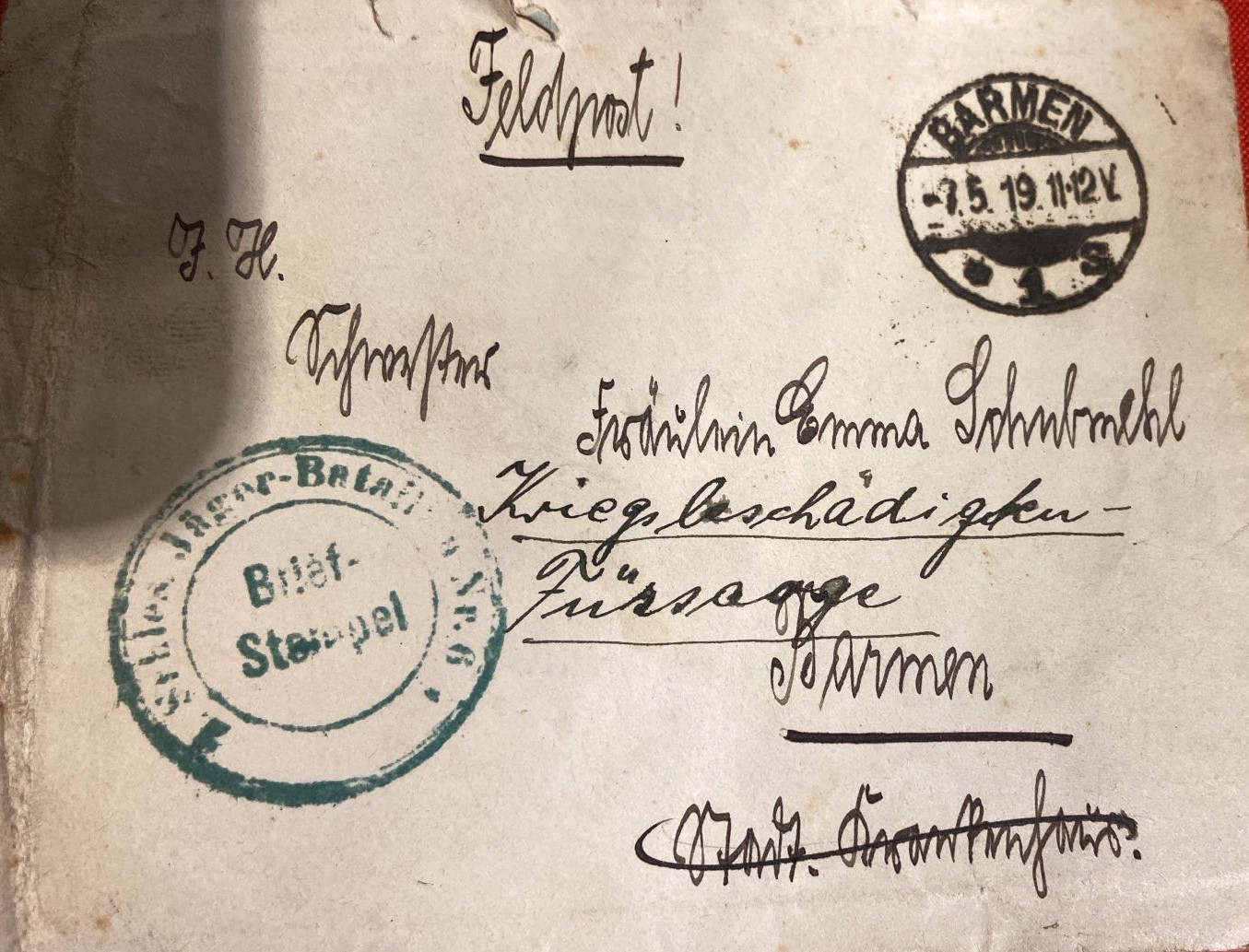
Later, from 1927 to 1934, she worked as a secretary for the Cologne criminal police.
.jpeg)


She remained unmarried and lived in Cologne-Zollstock, among other places, during this time.
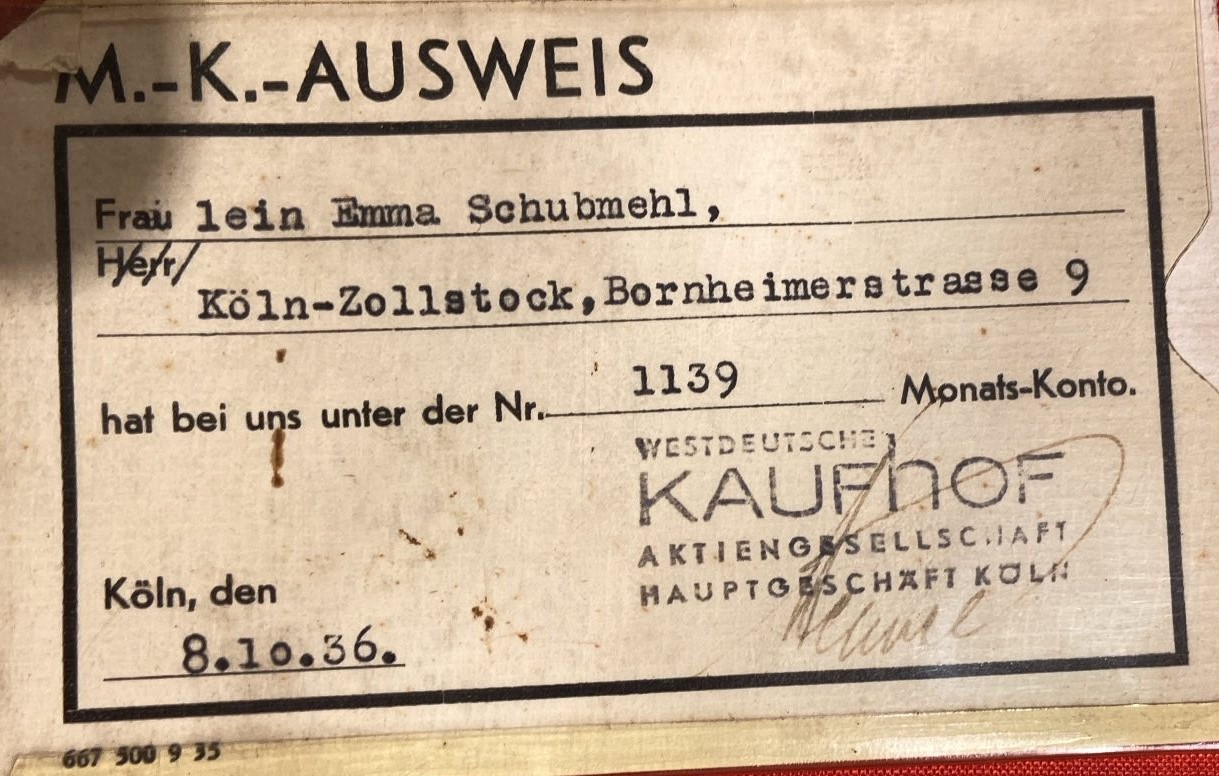
In 1935, she was forced into retirement under the pretext of "mental weakness" because of her active criticism of National Socialism and courageous rebellion against cases of injustice.

She appealed against this and was subsequently placed in a psychiatric hospital in 1937 and only released after 6 weeks.

In 1938, she was reinstated in the police force, but instead of being sent to Cologne, she was transferred back to Halle/Saale as a punishment. There she was to undergo a "National Socialist re-education measure".

Her brave resistance led to political differences again. At the beginning of 1939, the Nazi regime placed her in a psychiatric hospital (Leipzig Psychiatric Clinic) for the second time for indefinite periods of time.

She was able to escape being placed in a psychiatric hospital by fleeing and found shelter with friends, the Kieling family, with whom she
remained friends throughout her life (including through the "Wandervogel").
.jpeg)
3 months later, in March 1939, she was helped out of the jurisdiction of the Nazi authorities when the then police chief and government councilor from Cologne, as well as a police doctor, both of whom promptly declared her early retirement and discharged from service at the age of 44 "due to illness". However, in September 1939 she again applied for reintegration into the police service, which was again rejected, and her "early retirement due to illness" was confirmed.

From 1940 to 1942 she was able to work in youth and welfare assistance.

In 1941 Emma Schubmehl experienced a search of her Cologne apartment and
subsequent arrest by the Gestapo (Secret State Police, the feared instrument
of the Nazi government for persecuting citizens they suspected). The reason for
this was the accusation of undermining the national order.
Fortunately, a number of Gestapo officials intervened on her behalf, including a
former criminal commissioner.
This later led her to believe that her rescuers were secret opponents of the Nazi
regime: this also included a retired secretary, who from then on was to spy on
and supervise her on behalf of the regime. From 1942 to 1945 she worked as an
expert at the War Damages Office of the city of Cologne, with the task of
processing the war damages of the criminal police officers.
She later wrote that during the discussions with the individual officers she became
aware of their true political views (convinced Nazis or merely party book members
out of duty as civil servants) and that she was able to use this information to help
the American and English occupying forces after the war (for the purpose of
denazification).

In May 1944, an arrested member of Emma Schubmehl's Cologne resistance group was
sentenced to death by the Berlin Ministry of Justice. Emma Schubmehl intervened by
submitting a written request for clemency to Hitler's private office. The execution was
then postponed, and the psychiatric examination she had requested was actually
achieved, thanks to a favorable medical report. The pardon for her convicted friend was
then obtained on July 20, 1944.
Unfortunately, this was thwarted by a general order from Heinrich Himmler (the second
most powerful man in office after Hitler, Reich Minister of the Interior, responsible for all
concentration camps, commander of the SS and the Gestapo) that all those convicted
were to be executed immediately in order to empty the prisons in the chaos of the end of
the war. As a result, Emma Schubmehl's friend was tragically executed despite the
pardon being obtained.
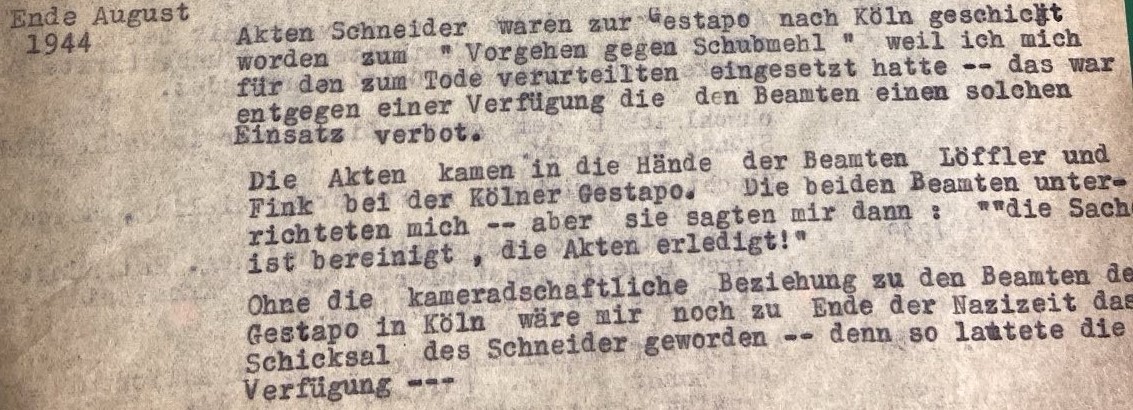
The Gestapo department that had been involved in Schneider's execution subsequently
issued an order that Emma Schubmehl, who had spoken up for someone sentenced
to death by the Nazi regime, something she was not allowed to do as an official, should
now also be put on trial. Her life was saved by two of the three Cologne Gestapo
officials who were well-disposed towards her and who, of all people, happened to get
their hands on the order concerning her. They wrote back to the sender of the order
saying that the case was closed and settled.
According to the order of the sender of the order concerning her, she was to suffer
the same fate as her executed friend from her Cologne resistance group. Shortly
before the end of the war, she had to leave her apartment in Cologne because it had
been bombed out. She was quickly moved into the attic apartment of the house
(then) "Beethovenstrasse 16", Bad Godesberg. This is the address of today's
Albert Schweitzer House, Beethovenallee 16).
An inner voice told her at the time: "You will stay here".
Emma Schubmehl later received the Federal Cross of Merit of the Federal Republic
of Germany for her commitment to others and her courage against the Nazi regime.

As a former civil servant, she received financial compensation from the Federal Republic of Germany even after the end of the war due to the injustices she had suffered at the hands of the Nazi regime (being placed in a psychiatric hospital, having her job terminated for a time, being forced to flee to avoid being placed in a psychiatric hospital again, forced retirement, harassment, threats, arrest, etc.). With this sum, she bought the entire house from the Cologne heirs Guillaume, in which she had previously only lived under the roof as a rented apartment. In it - quite consciously in line with her professional career and ethical attitude - she first set up the Child Protection Association, a home for children at risk.
.jpeg)
After the years of war and hunger, she consciously focused on the goals of welfare, care, health, and helping those at risk.
.jpeg)
Among other things, the health guidelines of Pastor Sebastian Kneipp were
guidelines for their commitment.Among other things, the health guidelines of Pastor Sebastian Kneipp were
guidelines for their commitment. As an emerging institution, the house became
a member of the Kneipp Association and Kneipp Federation.
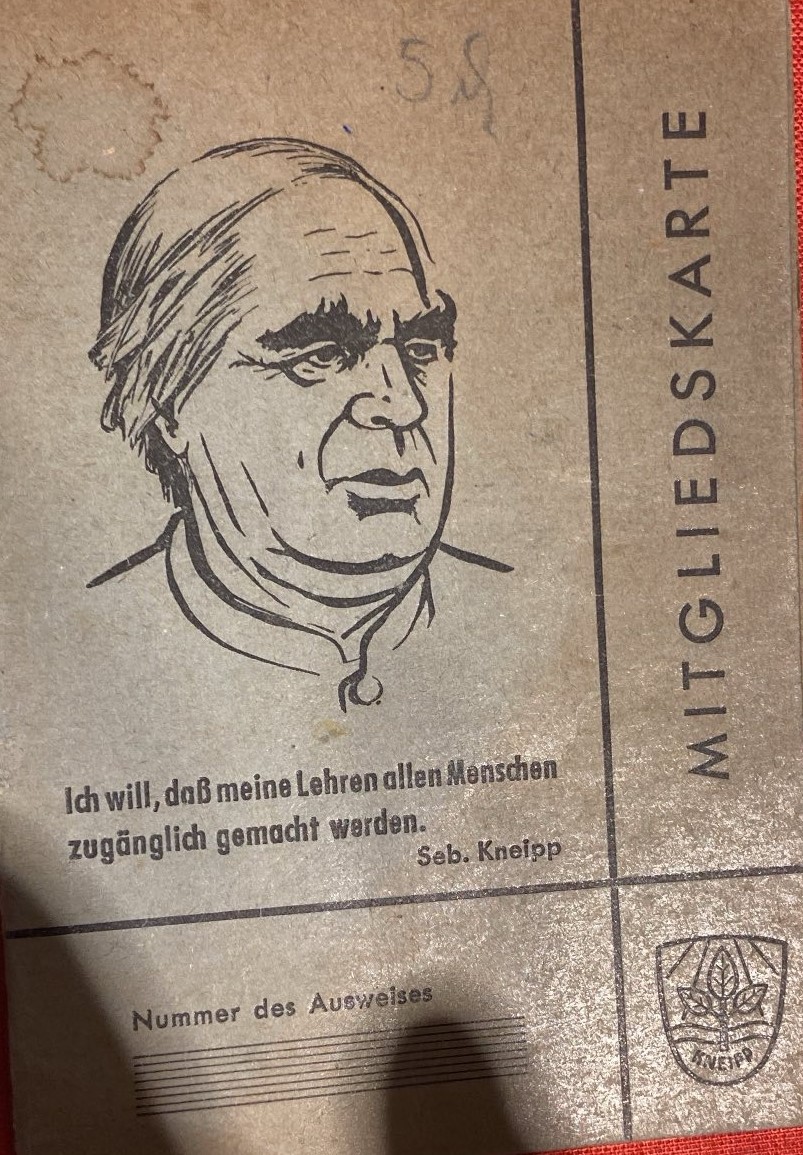
Her concept for the house was initially three-part:
1. On the ground floor, a vegetarian health diet was offered
2. On the ground floor, Kneipp courses and healthy exercise
3. On the first floor, an international children's boarding house for needy children and an international meeting place
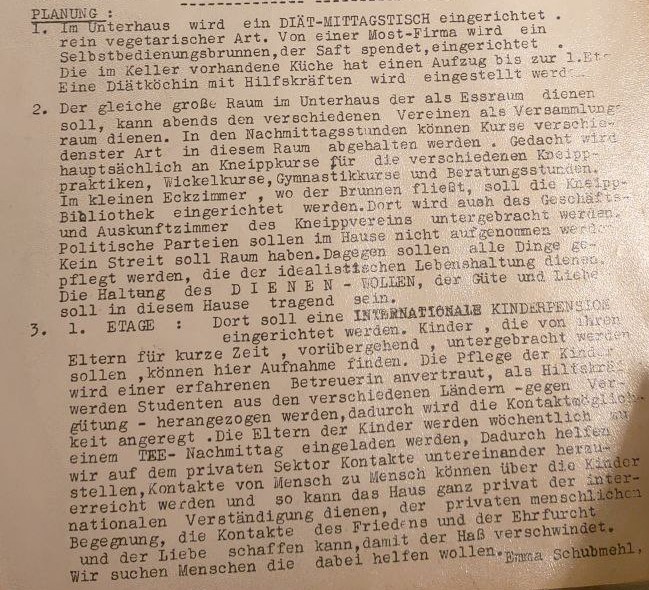
She joined the then Federal Republic Peace Union for a certain period of time and managed to have a private conversation in Leipzig with the then most powerful politician in the Soviet Union, the first secretary of the CPSU, Khrushchev. .

.jpg)
She admired Mahatma Gandhi for his peacefulness and also Albert Schweitzer for his selfless commitment to the people. She saw him as a benefactor, whom she described as the "master of health in the 20th century". In 1958, as part of the Godesberg Kneipp Association, which she was about to join, she had the opportunity to meet Albert Schweitzer's niece, who was working with him in Lambarene, his bush hospital in Africa.
.jpeg)
ab.jpeg)
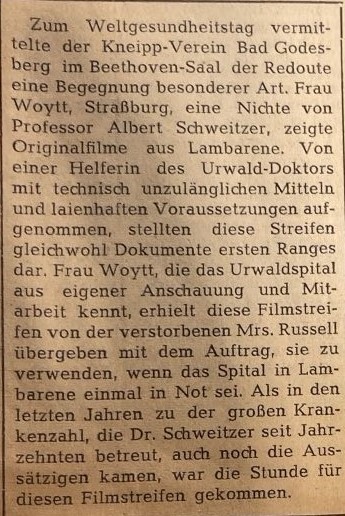
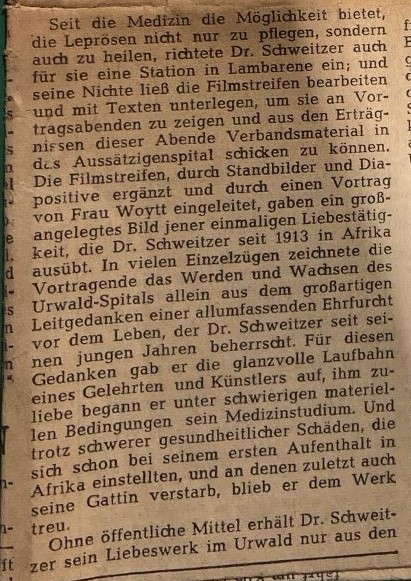
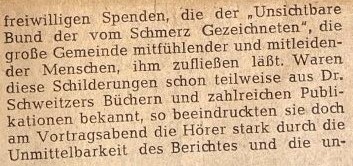
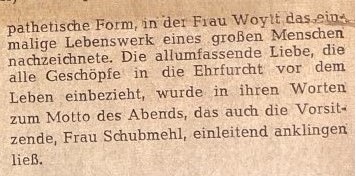
She wrote to Schweitzer in 1961, at the address of his hospital in Lambarene, Gabon, Africa, to ask him if she could call her house of care and health the "Albert Schweitzer House".
.jpg)
He replied, touched, and showed himself to be favorable to her project.
.jpg)
.jpg)
Another letter from 1962 from her correspondence with Albert Schweitzer has been preserved, in which he once again stressed his warm approval of her project and his fraternization with her as like-minded people.
.jpg)
He died in 1965, three years later.
In 1967, at the suggestion of Dr. Heinz Niedrig (a student of the enlightened Indian
doctor Dr Metha, who had been a friend and advisor to the young Mahatma Gandhi)
defined the objectives of the Albert Schweitzer House. The Albert Schweitzer House
Association was founded. The house increasingly developed into an institution for
lectures on spiritual, intellectual, religious, esoteric and (still) health topics, which it
has remained for almost 60 years.
.jpeg)
.jpeg)
For the continuation of the story, see the section: "History ans Aura of Blessing of the
"Albert-Schweitzer-House": www.ashbonn.de/index.php

